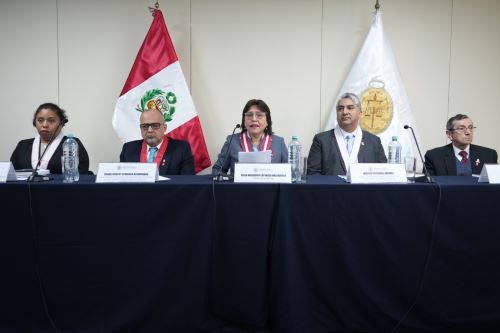The Attorney General's Office and environmental prosecutors warn that recently approved and proposed laws in Congress pose serious obstacles to effectively punishing those responsible for illegal mining, wildlife trafficking, and other environmental offenses.
Senior Prosecutor Frank Almanza Altamirano, national coordinator of the Environmental Prosecutor's Offices (FEMAs), warned that illegal mining causes losses of over S/22 billion (US$6.2 billion) per year—equivalent to 2.5% of Peru's GDP.
It is directly linked to organized crime, human trafficking, corruption, and money laundering nationwide.
In this regard, there are legal loopholes that benefit illegal mining, such as the repeated extensions of the Comprehensive Registry of Mining Formalization (Reinfo) and the Law on Artisanal and Small-Scale Mining (MAPE), which proposes a new parallel registry with no deadlines or legal requirements for informal activities.
Likewise, amendments to the Organized Crime Law exclude illegal mining, its financing, and environmental pollution from its scope because these offenses carry sentences of less than five years; changes to the Asset Forfeiture Law, the lack of mandatory registration for heavy machinery, among others, also contribute to the problem.
In turn
, Attorney General Delia Espinoza stated that illegal mining moves, processes, and trades seven times more financial resources than drug trafficking.
She added that despite the budgetary challenges facing the institution, "the Public Ministry will continue to work with autonomy, perseverance, and objectivity, respecting people's rights and applying the law and the Constitution as it should. That is our mission."

Prosecutorial achievements
It is worth noting that the Environmental Prosecutor's Offices (FEMAs) reported during a press conference that they secured 1,091 convictions in 2024 and 232 from January to May 2025.
In addition, 19 pretrial detention orders were obtained in 2024 and 15 so far in 2025, for crimes such as aggravated illegal mining, supply trafficking, and wildlife trafficking, among others.
Similarly, 1,698 camps, 224 heavy machines, 2,108 engines, 368 dredges, and 25,000 m³ of illegally harvested timber were destroyed last year.
Meanwhile, 39 cyanide pools, 21 mini dumpers, 7 mine entrances, over 30,000 gallons of fuel, and gold processing materials have been destroyed this year.
Public Ministry's Spokesman Victor Cubas emphasized that illegal mining is the crime that most severely impacts the national economy and the environment, with Condorcanqui, Madre de Dios, and Tambopata being the areas hardest hit by this scourge in Peru.
Throughout this assessment, the urgent need for increased funding and institutional strengthening was underscored in order to properly fulfill their assigned duties.
(END) NDP/JCC/JCR/MVB
Published: 7/11/2025